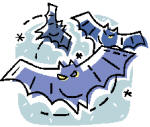 |
|||||||||||||||
|
|
|
|
|||||||||||||
|
SLAVIC VAMPIRES
by Beverley Richardson
The Slavic people including most east Europeans from Russia to Bulgaria, Serbia to Poland, have the richest vampire folklore and legends in the world. The Slavs came from north of the Black Sea and were closely associated with the Iranians. Prior to 8th century AD they migrated north and west to where they are now.
Christianization began almost as soon as they arrived in their new homelands. But through the 9th and 10th centuries the Eastern Orthodox Church and the western Roman Church were struggling with each other for supremacy. They formally broke in 1054 AD, with the Bulgarians, Russians, and Serbians staying Orthodox, while the Poles, Czechs, and Croatians went Roman. This split caused a big difference in the development of vampire lore - the Roman church believed incorrupt bodies were saints, while the Orthodox church believed they were vampires.
The origin of Slavic vampire myths developed during 9th C as a result of conflict between pre-Christian paganism and Christianity. Christianity won out with the vampires and other pagan beliefs surviving in folklore.
Causes of vampirism included: being born with a caul, teeth, or tail, being conceived on certain days, irregular death, excommunication, improper burial rituals etc. Preventative measures included: placing a crucifix in the coffin, or blocks under the chin to prevent the body from eating the shroud, nailing clothes to coffin walls for the same reason, placing millet or poppy seeds in the grave because vampires had a fascination with counting, or piercing the body with thorns or stakes.
Evidence that a vampire was at work in the neighbourhood included: death of cattle, sheep, relatives, neighbours, exhumed bodies being in a lifelike state with new growth of the fingernails or hair, or if the body was swelled up like a drum, or there was blood on the mouth and if the corpse had a ruddy complexion.
Vampires could be destroyed by staking, decapitation (the Kashubs placed the head between the feet), burning, repeating the funeral service, holy water on the grave, exorcism.
ROMANIA
GYPSIES AND VAMPIRES
EIGHTEENTH CENTURY VAMPIRE CONTROVERSY
|
|||||||||||||||
|
|||||||||||||||

